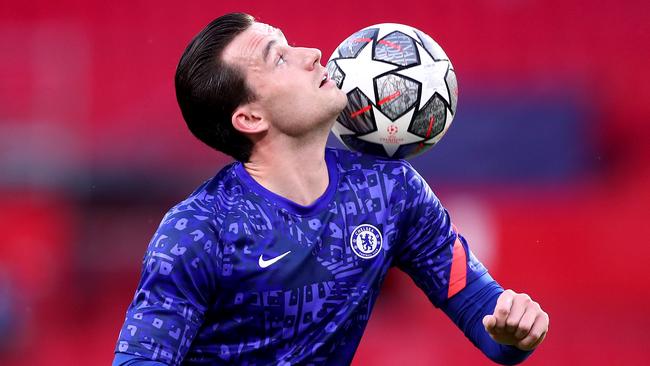Players have to stand up for the game that made them

Take Ben Chilwell at Chelsea, one of the more thoughtful characters in football. From a young age it was clear Chilwell possessed the sporting prowess and ambition to succeed, even excelling so much as a talented batsman that he was offered a professional cricket contract by Northamptonshire. Chilwell had the support of a good family network. He also benefited from a grassroots stage to provide the platform, the nurturing, the encouragement and early coaching.
Chilwell’s rise to his starting, starring position at Chelsea began at grassroots clubs in Bedfordshire like Woburn Lions and Bletchley Youth. He then gained more professional coaching at the Rushden & Diamonds centre of excellence before joining the academy at Leicester City.
His head coach at Chelsea, Thomas Tuchel, emphasised that neither he nor any of his players were involved “in the decision-making process” surrounding their club’s craven pursuit of money. Yet it does involve them and their consciences. Do they really want to see the rest of football, where some of them started, cut adrift by the plotters?
Certain players are talking privately with their representatives about how they should respond, if at all. Could they bite the hand that feeds them so lavishly? Some have spoken out, the likes of Mesut Ozil and Ander Herrera, professionals towards the end of their careers and not employed by one of the ESL’s founding clubs.
At Herrera’s old Premier League club, Manchester United, it is hard to imagine more contrasting characters and mindsets than Joel Glazer, the United co-chairman and ESL vice-president, and the flying philanthropist Marcus Rashford. Where Rashford feeds the hungry, Glazer gorges on debt and broadcast deals. Rashford, the symbol of all that is good in the United dressing room, has always acknowledged the grassroots club with whom he took his first fleet-footed steps, Fletcher Moss Rangers just off Junction 5 on the M60.
The grassroots are crying out for further funding, especially after the pandemic played havoc with budgets, and harsh winters damaged pitches. The prospect of less money flowing down has inevitably rung many alarm bells.
It is difficult for Rashford to stand up against his paymaster, but such a principled individual, and still a fan at heart, surely cannot be happy with the situation. A competition like the ESL lacks the charm, allure and sporting challenge of the Champions League. Players did not sign up for the ESL. They want the glory of the Champions League.
Herrera, 31 and now at Paris Saint-Germain, posted an emotional tweet articulating his anger against the ESL as “the rich stealing what the people created”. He recalled growing up at Real Zaragoza, where his father, Pedro, played as a midfielder and then worked as general manager. Clubs like Zaragoza matter. They are the bedrock on which the sport is built. Everyone who pulls on their white shirt, or worships as a fan at La Romareda stadium, deserves to have the hope that their beloved club could do something one day.
“I fell in love with popular football, with the football of the fans, with the dream of seeing the team of my heart compete against the greatest,” Herrera wrote. “If this (ESL) advances, those dreams are over.”
It is why clubs as diverse as Zaragoza and Fletcher Moss deserve protecting. No child stepping on to a school playing field or grassroots club’s pitch for the first time is thinking about making a fortune out of the game; they are motivated by the joy of playing, the kinship and a medal or trophy. The club pinnacle on offer now under the ESL plotters is a match that could have nothing riding on it, beyond midweek churn for viewers: another day, another el Plastico.
Over at another club where the creed is now greed, Tottenham, it would be interesting to know the public thoughts of Harry Kane, another indebted to grassroots and the pyramid. Kane began at Ridgeway Rovers in Chingford, east London, and developed on loan at Leyton Orient and Millwall. And if his chairman, Daniel Levy, forces through this unwanted league, will Kane fret over his international eligibility? As England captain, Kane needs to voice his opinion on the ESL.
Along the North Circular Road lies Arsenal, now home to an England international-in-waiting, Emile Smith Rowe, whose journey towards the top began at Junior Elite grassroots club (also home to Aaron Wan-Bissaka), in Beckenham, south London. Liverpool have Joe Gomez, who started out in Catford, south London, at clubs such as Marvels Lane, Lewisham Youth Green and Ten Em Bee. John Stones played for Penistone Church before joining Barnsley in the EFL, then climbing via Everton to Manchester City.
All these players at the “big six” started somewhere. Their clubs’ owners needed to recognise that reality. And even if a deal is done whereby the ESL clubs remain in their domestic leagues, those competitions will still be devalued.
The sporting jeopardy will disappear as the founding clubs know they are guaranteed entry to the seismic new competition. The edge will go from games, fans will turn away, viewers may turn off, players will not be so challenged.
There are so many reasons for players to speak out and rescue the sport they love.
The Times



The European Super League destroys hopes and pathways. It threatens the existence of grassroots clubs and clubs in the pyramid by concentrating wealth at the closed-off elite end. It is why players at the “shameless six” — Arsenal, Chelsea, Liverpool, Manchester City, Manchester United and Tottenham Hotspur — must join the resistance, protecting the fields where their dreams first formed.